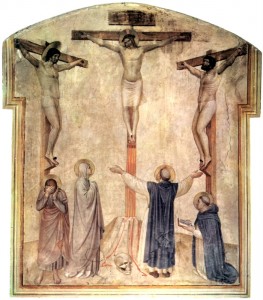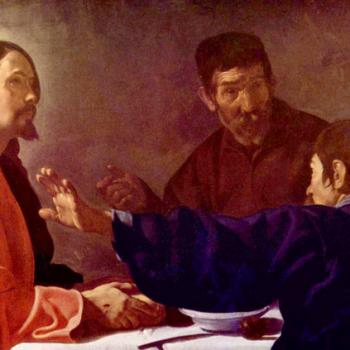The nations and the people.
The Gentiles and Israel.
As Luke tells the story, the conspiracy for Jesus’s death was as universal and all encompassing as it was groundless.
Jesus who came proclaiming justice becomes the victim of gross injustice. Without a guilty verdict, without a charge that could stick, an innocent man was crucified.
When Jesus’ followers reflect back on this story in the book of Acts they see it as a betrayal of both the Lord God and his anointed Messiah. They see it as the fulfillment of Psalm 2 (Acts 4:23-28):
Why do the nations (the Gentiles!) conspire?
And why do the peoples (Israel!) imagine a vain thing?The kings of the earth take their stand
And the rulers take counsel together (Herod of the Jews and Pilate of the Gentiles)
Against the Lord and against his Messiah.
No Charge. No Guilt.
In Luke’s gospel there is no nocturnal kangaroo court before the Jewish leadership. The gathering of the Sanherin happens, we are explicitly told, when it was day.
They have a very simple question for Jesus: are you the Messiah? 
Jesus claims that the Son of Man will be enthroned at God’s right hand.
And they reiterate their question: So, you’re the son of God?
Son of God means “messiah.” It’s a way of designating Israel’s king.
He more or less owns it. And that’s that.
There are no witnesses, true or false. There is no accusation of blasphemy. There is no sentence of condemnation.
This has not been a trial so much as a grand jury investigation. Now they know what to tell the Romans: this guy is claiming to be a king.
Jesus is guilty of nothing, but they have a “charge” that would be seen as seditious to the Romans.
The charges are all political: he’s telling us not to pay taxes (i.e., telling us that we’re not subject to Rome) and claiming to be a king.
But Pilate doesn’t buy it.
Then he finds out Jesus is Galilean, and (only in Luke’s Gospel) sends Jesus to Herod, who happens to be in town. Herod mocks Jesus, doesn’t get to see a cool miracle, and sends Jesus back.
Herod didn’t find any guilt in him either.
That’s the end of it. There is no condemnation. Jesus is innocent. This is the most important dynamic of the conspiracy against Jesus in Luke’s Gospel. There is no blasphemy charge. Nobody ever says that “we have a law and by that law he must die.”
The crowds simply demand. They insist. And Pilate concedes.
The kings of the earth, together with the peoples of Israel, take their stand against the Lord and against his Messiah.
Innocence and Forgiveness
It’s in Luke that Good Friday is marked by a dispute between the bandits on the crosses crucified with Jesus. While one mocks like everyone else the other has eyes to see.
“Don’t you fear God?” he asks. He knows that the conjunction of heaven and earth is forged through this Jesus and the kingdom he brings.
“We have been condemned justly… but this man has done nothing wrong.”
There it is.
Innocence.
The man sees that Jesus is just, that his own punishment is just, and that Jesus’s hanging on a tree is the nadir of the world’s injustice. Perpetrated by Jew and Gentile, crowd and elite alike.
Confronted with injustice in the body of the just, the man asks for salvation: “Jesus, remember me when you come into your kingdom.” “Today you will be with me in paradise.”
How does the cross work in Luke? It works by cleaving a gulf between the judgment of God and the judgment of humanity.
All humanity, represented by the kings and peoples, condemn Jesus to death.
God had already testified to his pleasure in Jesus through the Spirit, signs, wonders, and miracles.
Jesus was just. But people condemned him. God, in turn, will vindicate Jesus and testify to him once again by raising him from the dead.
In Luke, the cross doesn’t deal with our guilt so much as show us that everyone is guilty and in need of forgiveness. Because this man Jesus, as the centurion confesses, was surely innocent.
When Jesus cries out from the cross (only in Luke), Father, forgive them, he is embodying the divine response to humanity’s failure that finishes the crucifixion story. When the cross makes us cognizant of guilt, we will turn and seek and find forgiveness.
Complicit
Read the sermons in Acts, and they focus here: complicity in the death of Jesus. Complicity in unjust violence.
Good Friday is a day for remembering not just that Jesus died. And not just that Jesus died for us. But that this act of violence against Jesus is our act against him.
And, lest we forget, this is the Jesus who identifies himself with those who find themselves on the wrong side of injustice. “Any time you did not feed one of these brothers or sisters of mine, you did not feed me.”
Good Friday is a mirror for us, not just to see, in some general way, that the weight of our sin is so heavy that this heavy act had to be done in turn.
Good Friday is a day for us to see that all of our acts of violence and injustice place us in need of divine forgiveness. Kings and people, Jews and Gentiles alike. We have aligned ourselves with the economy of wealth, and power, upheld by systemic violence against lives and bodies.
We need to be forgiven. Perhaps most of all for the failure to trust that Jesus gives the gift of paradise that we strive to build for ourselves through our destruction of him wherever we may find him.











